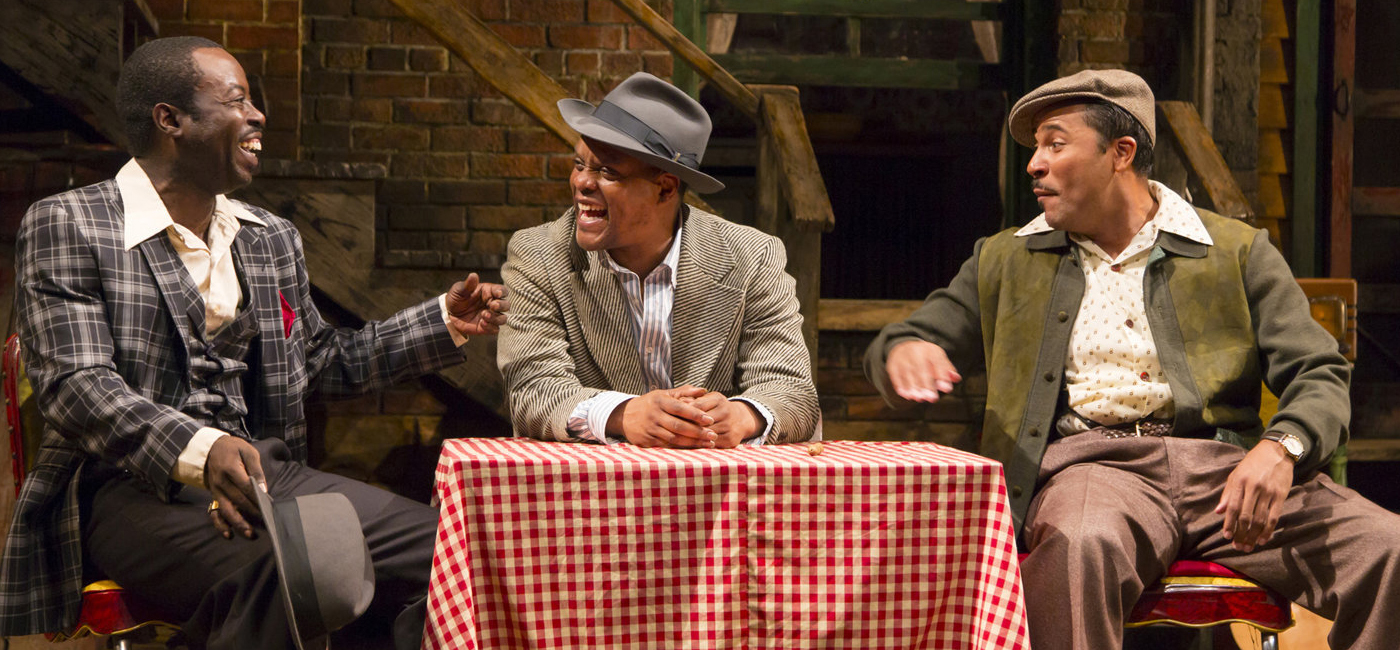
Samuel French is proud to support the August Wilson Monologue Competition, which was created by Kenny Leon and True Colors Theater Company in 2007 to carry on the legacy of August Wilson through the next generation of theatre artists. In 2017, the Dallas Competition expanded to include essays written about Mr. Wilson’s work.
Seven Guitars is one of the ten plays in August Wilson’s Pittsburgh Cycle, and yes, it’s critically acclaimed just like several of his other plays, not only for the raw, uncut exposure of African American life in the Pittsburgh Hills District, but for the unique beauty it exudes by simply having one thing: rhythm. The play is titled Seven Guitars because as Floyd Barton returns back home from Chicago as an aspiring musician, he’s reunited with friends he left behind and reconnected with past loved ones, such as Vera. While taking a raw cut of real conversations about Black America through the inspired yet simple life of Floyd Barton, Wilson creates a seven-person, out-of-tune blues symphony with a lyrical twist.
In the 19th century, slaves weren’t allowed to own musical instruments. However, they created their own makeshift instruments, thus creating the following music genres: country, gospel, and most importantly, the blues. The blues were the soul of the black community because they communicated the struggles, triumphs, and political times in our most natural state. One of the few rights slaves were entitled to and completely utilized was Sunday morning service. Several became so enamored with the idea of a supreme being, they began to write gospel music that generally followed the premise of, “Life is hard, but they’re gonna get better,” which makes it no surprise that when the 13th amendment was passed, the black communities revolved around predominantly black churches, and partially the music created within them. Several former slaves uprooted their lives over time to move to the North to find employment, considering the Jim Crow laws passed within the South that left blacks in a constant cycle of debt and confinement. From there, African Americans began to create not only gospel music, but also poetry about their struggle, which began to be translated to jazz. Eventually certain establishments such as the Cotton Club were created in appreciation for this music and in turn built togetherness with a new, established, American mindset. Over time, as the number of blacks learning to play more instruments increased, numerous bands were created, transitioning to smooth jazz and eventually to the hard-hitting blues, with yet the same general idea that inspired them in the first place: “Life is hard now, but it will get better.”
Seven Guitars not only symbolized black life but spiritually embodied it with an undeniable rhythm within the words. Subtlety engraved in this rhythm is the premise of love, loss, spirituality, and inequality—a simple recipe of one great blues hit. In addition to Wilson’s sentence structure, he cleverly manages to make every character’s hardship reflected in popular blues music, such as Vera and Louise’s loneliness, Ruby’s search for herself through sexuality, Red Carter’s glorious bachelor lifestyle, and Canewell’s implied, unrequited love for Vera. And for the characters not symbolizing important topics in blues music, their hardships served as reminders of the very oppressors that stemmed the creation of it, such as Hedley’s objective to have a prosperous plantation out of respect for his late father, who was cheated out of it by The White Man. This poses the very same idea of a man that keeps dangling Floyd’s dream in his face through displacement, as if a finish line were being moved farther and farther away. Similarly enough, Floyd being ridiculed for his displacement in Chicago and his desire to create a life for himself there someday is almost as symbolic as the prominent rooster in Pittsburgh, which crowed absurdly and clearly belonged in the South—symbolizing African Americans’ displacement in the North; yet it was the region in which blacks’ dreams were stored, buried, and hidden from the very blacks who believed in them once upon a time. Later on, the rooster was eventually killed, which just so happens to be in the very moment the characters are discussing the true significance, or lack thereof, of an African American during the time.
The Harlem Renaissance gave us a tool to channel our innermost thoughts that were not only exploited by the rest of the black community, but the white community as well. The Harlem Renaissance was one of the only periods in the early twentieth century where we saw the smallest glimmer of humanity peek through a dark, unjust era, regardless of your race or social ranking. The blues were created within black souls, but resonated in any and everyone else’s. Fast forwarding twenty years later in Pittsburgh, just like the blues, Seven Guitars’ lyrical phrasing, repetition and heart can timelessly resonate in anyone’s soul, which is what I believe makes Wilson’s works continuously studied.
Although my generation will never be able to experience the complexities of the blues, we are living the effects of it. No, not every millennial is just dying to learn how to play the sax, but we still feel and understand the depths of the destruction of our people. Seven Guitars is still considered a timeless play due to the fact that it’ll constantly challenge audiences to discover the underlying question still unsolved nearly seven decades later than the time period it was written in: “Do we even matter?” And if we happen to know the answer, does it even matter if our oppressors don’t think the same?
To purchase a copy of August Wilson’s Seven Guitars, click here, and to learn more about licensing a production, click here.

Comedy Mysteries: Gasps, Laughs and Thrills

A Children’s Theatre Classic: An Interview with Snow White And The Seven Dwarfs Composer Michael Valenti

